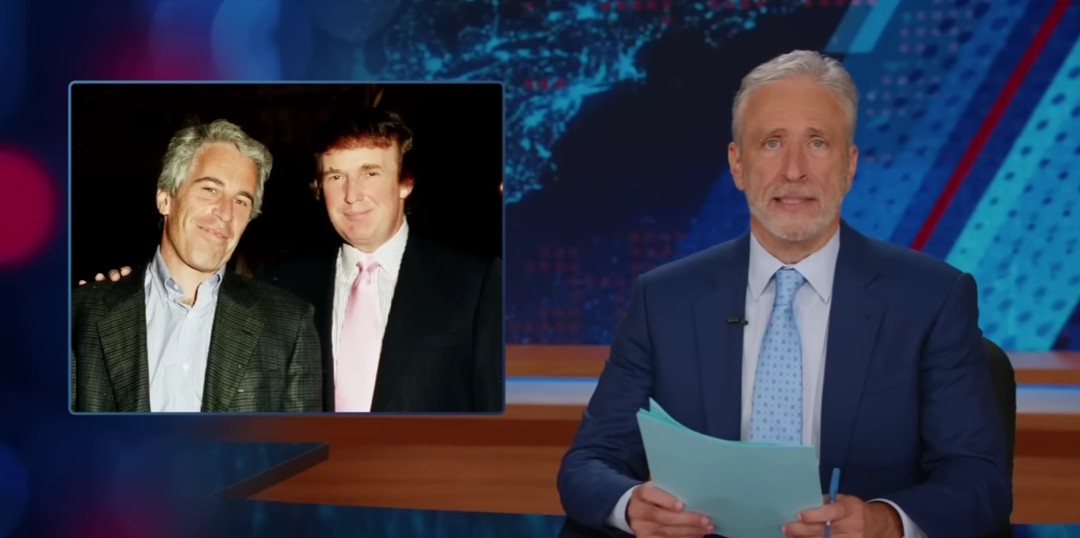
Jon Stewart didn’t just defend Stephen Colbert after CBS axed The Late Show. He detonated. In a monologue that ricocheted across social media and newsrooms, Stewart’s fury was as raw as it was surgical, slicing through corporate PR and political subtext with the kind of precision that only comes from decades in the late-night trenches.
“A Blockbuster Kiosk in a Tower Records”: Stewart’s Eulogy for Late Night
Stewart opened with a metaphor that felt both nostalgic and damning: running a late-night show today, he said, is like operating a Blockbuster kiosk inside of a Tower Records. The business model is crumbling, but Stewart’s point was that you don’t just shutter the doors when the winds change. When CDs stopped selling, they didn’t just go, “Oh well, music, it’s been a good run,” he quipped, his voice laced with both affection and exasperation for the industry that made him a household name.
The $8 Billion Elephant in the Room
CBS, owned by Paramount, insists Colbert’s firing was “purely a financial decision.” Stewart, never one to let a euphemism go unchallenged, called this out as corporate cowardice. He pointed to the looming$8 billion Paramount-Skydance merger, which needs the Trump administration’s blessing, and the network’s recent$16 million settlement with President Trump over a “60 Minutes” interview as evidence that something more insidious was at play. Stewart said he understands the fear that you and your advertisers have with$8 billion at stake, but insisted the shows you now seek to cancel, censor, and control—a not insignificant portion of that$8 billion value came from those shows. That’s what made you that money.
“Pre-Compliance” and the Art of Surrender
Stewart’s monologue wasn’t just a defense of Colbert; it was a diagnosis of a wider malaise. He described a culture of fear and pre-compliance gripping American institutions, a kind of anticipatory obedience to political power that, in his view, is more dangerous than any single act of censorship. If you believe as corporations or as networks, you can make yourselves so innocuous that you can serve a gruel so flavorless that you will never again be on the boy king’s radar, why would anyone watch you and you are wrong, Stewart thundered.
The Colbert Connection: More Than Just Colleagues
Stewart’s relationship with Colbert is the stuff of late-night legend. Their camaraderie dates back to the early 2000s, and Stewart made it clear that his outrage was personal. Watching Colbert become the number one late-night host was, Stewart said, an undeniable great pleasure for me as a viewer and as his friend. But the monologue was also a warning: if Colbert can be cut loose, no one is safe—not even Stewart himself.
“Go F— Yourself”: The Gospel According to Jon
The monologue’s crescendo was pure Stewart. After a gospel choir serenaded the crowd, he delivered his message to media companies who bend the knee to Trump in the name of self-preservation. If you’re afraid and you protect your bottom line, I’ve got but one thing to say: Go f— yourself, he declared, echoing Colbert’s own recent on-air barbs.
The Real Cost of Playing It Safe
What Stewart’s monologue captured, beyond the headlines and hashtags, was a sense of loss. Not just for Colbert, but for a kind of television that once dared to challenge, provoke, and, yes, offend. The irony, Stewart noted, is that the very shows now being canceled are the ones that built the value these corporations are so desperate to protect. This is not the moment to give in. I’m not giving in, he vowed, his words a rallying cry for anyone who still believes late night can matter.
The Takeaway: When Institutions Flinch, Comedians Don’t
In the end, Stewart’s monologue was less about Colbert’s firing and more about the cost of institutional timidity. It was a reminder that, in an era of mergers, lawsuits, and political pressure, the sharpest voices are often the first to be silenced. But as long as there are comedians willing to torch the playbook, the conversation isn’t over. Not by a long shot.
